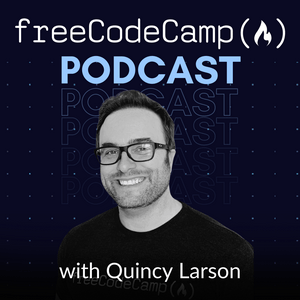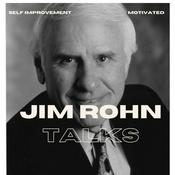204 episodes
#206 Tips from a 20-year developer veteran turned consultancy founder – Tapas Adhikary interview
1/29/2026 | 1h 19 mins.Today Quincy Larson interviews Tapas Adhikari. He's a software engineer who runs a firm of 20 developers who build projects for companies around the world. He's also a prolific teacher, having written 300 programming tutorials - including 47 for freeCodeCamp – and runs a popular English and Bangla-language YouTube channels.
We talk about:
- The changing nature of software engineering
- Tips for building your own fully-remote software development firm and landing clients abroad
- Lessons from mentoring more than 500 developers over the years
Support for this podcast comes from the 10,104 kind folks who donate to our charity each month. Join them and support our mission at https://donate.freecodecamp.org
Get a freeCodeCamp tshirt for $20 with free shipping anywhere in the US: https://shop.freecodecamp.org
Links from our discussion:
- Tapas's handbook on how to get started contributing to open source projects (required reading IMHO): https://www.freecodecamp.org/news/a-practical-guide-to-start-opensource-contributions/
- Tapas's many tutorials and handbooks on freeCodeCamp: https://www.freecodecamp.org/news/author/atapas/
- The developer firm Tapas co-founded and nows runs with more than a dozen developers: https://www.creowis.com/
- Tapas's personal website: https://www.tapasadhikary.com/
- Tapas's English-langauge programming tutorial YouTube channel: https://www.youtube.com/@tapasadhikary
Community news section:
1. freeCodeCamp just published a new Python Data Structures & Algorithms course that will help you understand key Dynamic Programming patterns. These approaches come up all the time in technical interviews. You'll learn Constant Transition, the Grid Pattern, Two Sequences, Interval DP, Non-Constant Transition, Knapsack-like problems, and more. (2 hour YouTube course): https://www.freecodecamp.org/news/learn-dynamic-programming-through-dynamic-visuals/
2. If you're interested in building projects on top of Large Language Models, freeCodeCamp just published a Python course on Retrieval-Augmented Generation (RAG). You'll learn how to turn documents into embeddings then store them in vector databases. The course will also walk you through building your own Model Context Protocol (MCP) server. (2 hour YouTube course): https://www.freecodecamp.org/news/learn-rag-and-mcp-fundamentals/
3. Learn How Execution Context Works in JavaScript. If you're a JS dev, this is essential reading. You'll learn about interpretation vs compilation. Then you'll see how Node.js and the V8 engine load and execute code. (full length handbook): https://www.freecodecamp.org/news/how-execution-context-works-in-javascript-handbook/
4. Finally, this weekend you can build your own fully-playable horror game based on the legendary "The Backrooms" liminal space. For some reason my kids are terrified of this weirdly normal-looking office setting. You'll build your own environment using Unreal Engine 5 and the Blueprints visual scripting tool that abstracts away all the C++ code for you. Throw in a body-cam style camera perspective and some creepy monsters and you'll have the perfect way to scare friends and family alike. (3 hour YouTube course): https://www.freecodecamp.org/news/build-a-the-backrooms-game-in-unreal-engine-5/
5. Today's song of the week is And the Cradle Will Rock off Van Halen's 1980 album Women and Children first. The song starts out with a groove on a heavily distorted Wurlitzer elctromechanical piano. I love Michael Anthony's 8th note bassline and the loose high hats under Eddie Van Halen's guitar solo. This is a great lunch break song. https://www.youtube.com/watch?v=11mBDT5mpdw- Today Quincy Larson interviews Sumit Saha, a software engineer and prolific teacher on YouTube. Sumit is based in Dhaka, Bangladesh, where he runs a developer agency building projects for clients throughout Asia.
We talk about:
- How the hunger for learning is dying and people are increasingly drawn to shortcuts over taking the time to truly understand concepts
- Sumit's information diet and his tips for expanding your skills
- 5 key developer concepts explained like you're 5
Support comes from the 10,104 kind folks who donate to our charity each month. Join them and support our mission at https://donate.freecodecamp.org
Get a freeCodeCamp tshirt for $20 with free shipping anywhere in the US: https://shop.freecodecamp.org
Links from our discussion:
- Sumit's many freeCodeCamp handbooks and tutorials: https://www.freecodecamp.org/news/author/sumitsaha/
- Sumit's website: https://www.sumitsaha.me/
- Sumit's Bangla-language YouTube Channel: https://youtube.com/@LearnwithSumit
- Sumit's English YouTube Channel: https://youtube.com/@logicBaseLabs
Community news section:
1. I spent three days at the San Francisco Palace of Fine Arts recording a documentary about the world's largest collegiate hackathon. More than 3,000 student developers participated in this year's UC Berkeley Cal Hacks hackathon. Over the course of 36 hours, they built a broad array of projects, then demo'd them to judges from industry. I now present to you the finished documentary. I hope you find it both enjoyable and inspiring. (80-minute documentary): https://www.freecodecamp.org/news/inside-cal-hacks-2025-36-hours-at-the-worlds-largest-collegiate-hackathon/
2. freeCodeCamp also published a new course on building your own custom Kubernetes operators and controllers from scratch. You'll learn everything from the internal architecture of Informers and Caches to advanced concepts like Finalizers and Idempotency. If you're interested in DevOps, this is the course for you. (6 hour YouTube course): https://www.freecodecamp.org/news/build-your-own-kubernetes-operators-with-go-and-kubebuilder/
3. Learn how to select the best GPU for economically training your models and running inference workloads. This no-nonsense guide will help you understand why certain specs matter more than others. It will also help you navigate around common pitfalls when buying or renting GPUs. (35 minute read): https://www.freecodecamp.org/news/how-to-choose-the-best-gpu-for-your-ai-workloads/
4. Learn how to benchmark embedding models using your own custom data. This course will walk you through leveraging Vision Language Models for precise text extraction. You'll also learn how to use LLMs to generate synthetic evaluation data. Finally, you'll get exposure to the rigorous statistical tests that can help you find the best models for whatever hardware you have on hand. (4 hour YouTube course): https://www.freecodecamp.org/news/how-to-benchmark-embedding-models-on-your-own-data/
5. Our song of the week: Supergroup The Power Station's 1985 hit "Some Like it Hot". This entire album features incredible drumming by Chic drummer Tony Thompson. And with Bass and Guitars by Duran Duran's John Taylor and Andy Taylor, the whole song has insane groove. 80s icon Robert Palmer sings and brings the texture. The guy reportedly smoked 60 cigarettes a day and paid the price a few years later, but man is his voice golden on this recording. Fun fact: Duran Duran's official site says they achieved the massive drum sound by putting mics at the top of a nearby elevator shaft. https://www.youtube.com/watch?v=Hw1t7OCESUw #204 The Most Important Skills Going Forward with CTO + Homebrew Maintainer Mike McQuaid
1/16/2026 | 1h 27 mins.Today Quincy Larson interviews Mike McQuaid. He's a software engineer who previously worked at GitHub, and now serves as lead maintainer of Homebrew, a Mac package manager used by tens of millions of developers. He's based in Edinburgh, Scottland. He's worked remotely as a dev for nearly two decades.
We talk about:
- What does a career in open source really look like
- What skills are going to be the most important going forward
- How big open source infrastructure really gets written and maintained
Support for this podcast is provided by a grant from AlgoMonster. AlgoMonster is a platform that teaches data structure and algorithm patterns in a structured sequence, so you can approach technical interview questions more systematically. Their curriculum covers patterns like sliding window, two-pointers, graph search, and dynamic programming, helping you learn each pattern once and apply it to solve many problems. Start a structured interview prep routine at https://algo.monster/freecodecamp
Support also comes from the 10,104 kind folks who donate to our charity each month. Join them and support our mission at https://donate.freecodecamp.org
Get a freeCodeCamp tshirt for $20 with free shipping anywhere in the US: https://shop.freecodecamp.org
Links from our discussion:
- Mike's podcast, Minimum Viable Management: https://www.youtube.com/playlist?list=PLdx6vnBOYrMZw3ZHjJJyItqQuZQhTIzhc
- Homebrew 5.0 announcement with changelog: https://brew.sh/2025/11/12/homebrew-5.0.0/
- POSSE approach to social media: https://indieweb.org/POSSE
Community news section:
1. freeCodeCamp just published a book that will teach you the math that powers most AI systems. Even if you haven't studied math since high school, you may find this book helpful in expanding your understanding of the layers of abstraction underpinning these emerging tools. You'll learn key concepts in statistics, linear algebra, calculus, and optimization theory. You'll also get a healthy dose of mathematical history. (free full-length book): https://www.freecodecamp.org/news/the-math-behind-artificial-intelligence-book/
2. And if you're finding the sudden surge in AI tools to be overwhelming, freeCodeCamp just published this practical guide to using them effectively. This tutorial will separate the utility from the hype. You'll learn how to minimize hallucinations with Context Management. You'll also learn about agentic tools and in-editor assistants. It even has tips for how to prevent your own developer skills from atrophying, so you can adopt these tools without becoming overly dependent on them. (35 minute read): https://www.freecodecamp.org/news/how-to-not-be-overwhelmed-by-ai/
3. freeCodeCamp also published a course on React Optimization. You'll learn key React design patterns to achieve a screaming-fast front end. This course covers memoization, derived states, throttling, debouncing, concurrency, virtualization, and more. (2 hour YouTube course): https://www.freecodecamp.org/news/how-to-optimize-react/
4. Learn modern music production using the popular FruityLoops Studio Digital Audio Workstation tool. This FL Studio course will teach you sound design fundamentals, mixing, filters, drum sequencing, basslines, synth melodies, and even advanced concepts like kick drum ducking. You can play along at home and by the end of the course you'll have your own bass house track you can share with your friends. (3 hour YouTube course): https://www.freecodecamp.org/news/learn-music-production-with-fl-studio/
5. This week's song of the week is the 2022 song "Ditto" by Korean pop group New Jeans. I like the song feels slow and relaxed even though the tempo is really fast. It has really minimalist production - mainly just 808 drums and vocals. Perfect late night listening. https://www.youtube.com/watch?v=V6TEcoNUmc8#203 First developer job at age 38 with lawyer turned software engineer Zubin Pratap
1/09/2026 | 1h 13 mins.Today Quincy Larson interviews Zubin Pratap, a software engineer and manager from Melbourne, Australia. After nearly two decades working as a corporate lawyer, he taught himself programming using freeCodeCamp.org. Within two years, he landed a job as a software engineer at Google.
We talk about:
- How tools are making programming easier, but other parts of being a developer harder
- How 2009 - 2022 was NOT a normal job market and how devs are adapting
- "The purpose of communication is to be understood" and other lessons Zubin's learned over the years
Support for this podcast is provided by a grant from AlgoMonster. AlgoMonster is a platform that teaches data structure and algorithm patterns in a structured sequence, so you can approach technical interview questions more systematically. Their curriculum covers patterns like sliding window, two-pointers, graph search, and dynamic programming, helping you learn each pattern once and apply it to solve many problems. Start a structured interview prep routine at https://algo.monster/freecodecamp
Support also comes from the 10,104 kind folks who donate to our charity each month. Join them and support our mission at https://donate.freecodecamp.org
Get a freeCodeCamp tshirt for $20 with free shipping anywhere in the US: https://shop.freecodecamp.org
Links from our discussion:
- Zubin's LinkedIn and other social media: https://meetzubin.carrd.co/
- Zubin's "Easier said than done" podcast on YouTube: https://www.youtube.com/watch?v=Ky4Hhd-k1js&list=PLAPuklwJx5V3fpXiSD9CMh3RhPQTCSemj
Community news section:
1. Let's kick off 2026 with a ton of announcements. We just launched Version 10 of freeCodeCamp's JavaScript certification, along with updated Python, SQL, and Responsive Web Design certifications that you can earn. We even launched our beta Spanish and Mandarin Chinese curricula. (10 minute announcement article with tons of data): https://www.freecodecamp.org/news/christmas-gifts-freecodecamp-community-2025
2. Now you can learn Spanish on freeCodeCamp. We just launched our FREE A1 Level Spanish curriculum. You'll learn: pronunciation, introductions, numbers, and more. More than 200 steps are live now. ¡Aprendamos! https://www.freecodecamp.org/news/freecodecamps-a1-professional-spanish-curriculum-beta-is-now-live/
3. Over the holiday break I took my kids to Johnson Space Center in Houston. If you're in Houston you should absolutely go here. We visited the Mission Control center that NASA used during the Apollo missions to the moon. They also had an awesome multimedia experience created by Tom Hanks about this year's Artemis mission to the moon. This is an incredible museum. We spent 7 hours there. It wasn't particularly expensive. Just make sure you book tickets to mission control a few months in advance of your trip.
4. During the road trip, I re-listened to Guns 'n' Roses's entire catalogue. Which brings me to today's song of the week: the 1991 epic Estranged. The is maybe the most mature-sounding song they've ever done, with introspective lyrics and a series of tastful, emotional guitar solos. Great drum fills, too. https://www.youtube.com/watch?v=dpmAY059TTY#202 How to get promoted as a dev without becoming a manager – Staff Engineer Santosh Yadav interview
12/19/2025 | 1h 4 mins.Today Quincy Larson interviews Santosh Yadav. The son of a textile worker, he grew up inner-city Mumbai and studied hard to get into university. From there he's worked as a software engineer for 16 years. Along the way, he's picked up every distinction imaginable including Google Developer Expert, GitHub Star, and Microsoft MVP.
Santosh shares tips for:
- How to get promoted as an Individual Contributor without needing to becoming a manager
- How to rise within a company without needing to change jobs to move up
- How to succeed socially on a team while working remotely remotely
- How to not just survive but thrive after a Type 2 Diabetes diagnosis
Support for this podcast is provided by a grant from AlgoMonster. AlgoMonster is a platform that teaches data structure and algorithm patterns in a structured sequence, so you can approach technical interview questions more systematically. Their curriculum covers patterns like sliding window, two-pointers, graph search, and dynamic programming, helping you learn each pattern once and apply it to solve many problems. Start a structured interview prep routine at https://algo.monster/freecodecamp
Support also comes from the 10,338 kind folks who donate to our charity each month. Join them and support our mission at https://donate.freecodecamp.org
Get a freeCodeCamp tshirt for $20 with free shipping anywhere in the US: https://shop.freecodecamp.org
Links from our discussion:
- Santosh's freeCodeCamp article: "From the Slums of Mumbai to a Rented Apartment – My 30-Year Developer Journey": https://www.freecodecamp.org/news/my-journey-into-tech-from-slums-of-mumbai-to-my-own-apartment/
- Santosh's freeCodeCamp article "My Developer Journey – How I Got a Remote Job and Increased My Salary While Contributing to Open Source": https://www.freecodecamp.org/news/my-developer-journey-how-i-increased-my-salary-and-got-a-remote-job/
- Santosh's journey to Staff Engineer and tips for getting promoted as an IC: https://www.santoshyadav.dev/blog/2025-03-29-my-journey-to-staff-engineer/
- Santosh's podcast on working in tech: https://www.youtube.com/c/ThisisTechTalks
-Santosh's article on how he realized he was introducing toxicity as a manager: https://dev.to/this-is-learning/how-i-made-workplace-toxic-1ici
Community news section:
1. freeCodeCamp just launched our new JavaScript Data Structures and Algorithms Certification and our new Python certification. The are 300-hour interactive courses. You can now take the final exams for both of these and earn a free verified certification, which you can then it to your LinkedIn, CV, résumé, or personal website. These are part of version 10 of the core freeCodeCamp curriculum. The community collectively spent thousands of hours developing all this to serve as your shortest path to acquiring programming fundamentals. (300 hour interactive curriculum – announcement article and FAQ): https://www.freecodecamp.org/news/freecodecamps-new-javascript-certification-is-now-live/ and https://www.freecodecamp.org/news/freecodecamps-new-python-certification-is-now-live/
2. Tell your friends who are learning English: freeCodeCamp just launched our English for Developers curriculum. You can learn vocab, grammar, reading, and listening – all through stories set in a Silicon Valley tech company. This is level A2 English, meaning it's lower intermediate. We'll introduce other CEFR levels in the coming months as well. (interactive curriculum with certification – announcement article and FAQ): https://www.freecodecamp.org/news/freecodecamps-a2-english-for-developers-certification-is-now-live/
3. Now you can learn Spanish on freeCodeCamp. We just launched our FREE Spanish curriculum. You'll learn: pronunciation, introductions, numbers, and more. More than 200 steps are live now. The rest of CEFR level A1 will go live in 2026. ¡Aprendamos! https://www.freecodecamp.org/news/freecodecamps-a1-professional-spanish-curriculum-beta-is-now-live/
4. Today's song of the week is the 1982 Disco Soul anthem "Walk on By" by D Train. You'll love the busy synth bass and soaring strings. Even though it's a sad song, I've listened to this song dozens of times and it never fails to pick me up: https://www.youtube.com/watch?v=zmEgxqSnHXQ
More Education podcasts
Trending Education podcasts
About The freeCodeCamp Podcast
The official podcast of the freeCodeCamp.org open source community. Each week, freeCodeCamp founder Quincy Larson interviews developers, founders, and ambitious people in tech.
Learn to math, programming, and computer science for free, and turbo-charge your developer career with our free open source curriculum: https://www.freecodecamp.org
Podcast websiteListen to The freeCodeCamp Podcast, The Mel Robbins Podcast and many other podcasts from around the world with the radio.net app

Get the free radio.net app
- Stations and podcasts to bookmark
- Stream via Wi-Fi or Bluetooth
- Supports Carplay & Android Auto
- Many other app features
Get the free radio.net app
- Stations and podcasts to bookmark
- Stream via Wi-Fi or Bluetooth
- Supports Carplay & Android Auto
- Many other app features


The freeCodeCamp Podcast
Scan code,
download the app,
start listening.
download the app,
start listening.








































